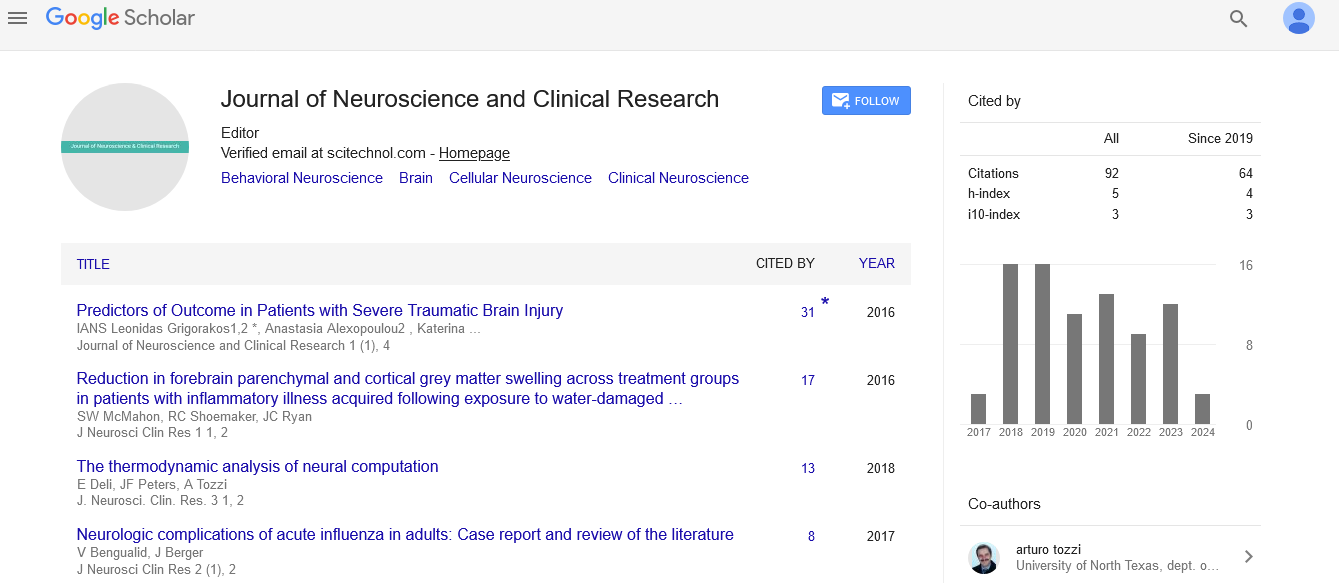Perspective, J Neurosci Clin Res Vol: 8 Issue: 1
Molecular Mechanisms of Neuronal Development and Regeneration
Ali Maryam*
Department of Clinical Medicine, Aarhus University, Aarhus C, Denmark
*Corresponding Author: Ali Maryam
Department of Clinical Medicine, Aarhus
University, Aarhus C, Denmark
E-mail: ali.marii@clin.au.dk
Received date: 28 February, 2023, Manuscript No. JNSCR-23-95535;
Editor assigned date: 03 March, 2023, Pre QC No. JNSCR-23-95535(PQ);
Reviewed date: 17 March, 2023, QC No. JNSCR-23-95535;
Revised date: 24 March, 2023, Manuscript No. JNSCR-23-95535(R);
Published date: 31 March, 2023, DOI: 10.4172/Jnscr.1000149
Citation: Maryam A (2023) Molecular Mechanisms of Neuronal Development and Regeneration. J Neurosci Clin Res 8:1.
Description
Neuronal development and regeneration are complex processes that involve a variety of molecular mechanisms. These mechanisms include gene expression, signaling pathways, and epigenetic modifications, among others. Understanding these mechanisms is important for developing therapies to promote neuronal regeneration and repair following injury or disease.
Gene expression refers to the process by which genes are transcribed into Messenger RNA (MRNA), which is then translated into proteins. During neuronal development, gene expression plays an important role in determining the fate of developing neurons. For example, certain genes may be expressed in a developing neuron to promote its differentiation into a particular cell type, such as a motor neuron or a sensory neuron.
In neuronal regeneration, gene expression is also important for promoting the growth and survival of new neurons. After injury or disease, the expression of certain genes may be altered to promote the growth of new neurons or to prevent cell death. For example, the expression of growth factors, such as Brain-Derived Neurotrophic Factor (BDNF), can promote the growth and survival of new neurons following injury.
Signaling pathways refer to the complex networks of molecules that transmit signals between cells. These pathways play an important role in neuronal development and regeneration by regulating a variety of cellular processes, such as cell proliferation, differentiation, and survival. One important signaling pathway in neuronal development and regeneration is the Notch signaling pathway.
The Notch signaling pathway is involved in the regulation of cell fate decisions during neuronal development. Activation of the pathway can promote the differentiation of neural stem cells into neurons or other cell types. In neuronal regeneration, the Notch signaling pathway may also play a role in promoting the growth and survival of new neurons. For example, activation of the pathway has been shown to increase the proliferation of neural stem cells in the adult brain.
Epigenetic modifications refer to changes in gene expression that are not caused by alterations to the underlying DNA sequence. These modifications can include changes in chromatin structure, DNA methylation, and histone modifications. Epigenetic modifications are important for regulating gene expression during neuronal development and regeneration.
During neuronal development, epigenetic modifications can regulate the expression of genes that are important for cell fate decisions. For example, histone modifications can promote or inhibit the expression of genes that are involved in the differentiation of neural stem cells into neurons. In neuronal regeneration, epigenetic modifications may also play a role in promoting the growth and survival of new neurons. For example, changes in DNA methylation have been associated with increased neurogenesis following injury.
Other molecular mechanisms that are important for neuronal development and regeneration include Extracellular Matrix (ECM) molecules, growth factors, and neurotransmitters. The ECM is a complex network of proteins and other molecules that provides structural support for developing neurons and regulates their migration and differentiation. Growth factors, such as BDNF, promote the growth and survival of new neurons following injury. Neurotransmitters, such as dopamine and serotonin, are important for regulating neuronal activity and can promote the growth and survival of new neurons.
In summary, neuronal development and regeneration involve a variety of molecular mechanisms, including gene expression, signaling pathways, epigenetic modifications, ECM molecules, growth factors, and neurotransmitters. Understanding these mechanisms is important for developing therapies to promote neuronal regeneration and repair following injury or disease.
 Spanish
Spanish  Chinese
Chinese  Russian
Russian  German
German  French
French  Japanese
Japanese  Portuguese
Portuguese  Hindi
Hindi 